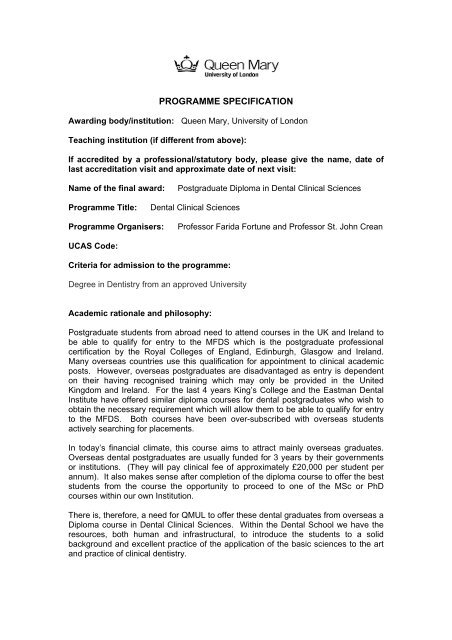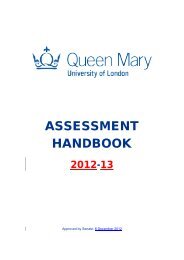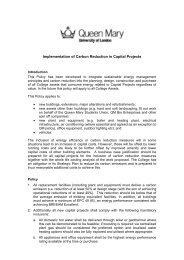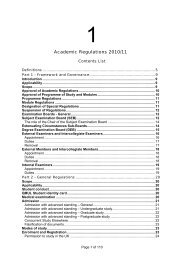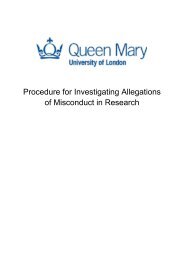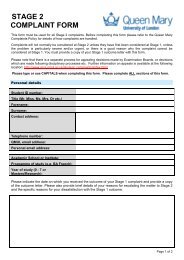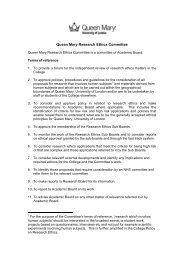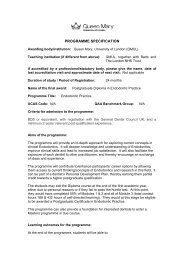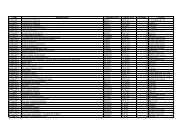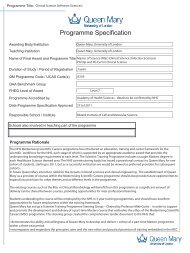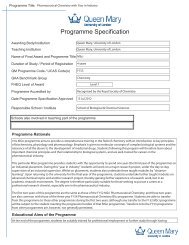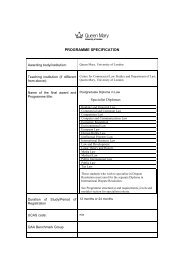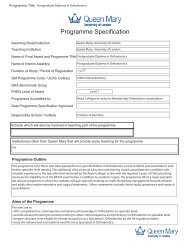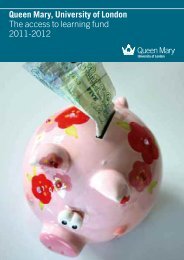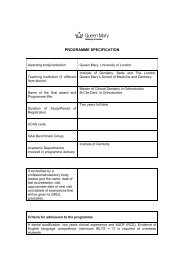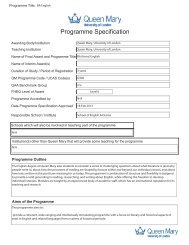Postgraduate Diploma in Dental Clinical Sciences - Queen Mary ...
Postgraduate Diploma in Dental Clinical Sciences - Queen Mary ...
Postgraduate Diploma in Dental Clinical Sciences - Queen Mary ...
You also want an ePaper? Increase the reach of your titles
YUMPU automatically turns print PDFs into web optimized ePapers that Google loves.
PROGRAMME SPECIFICATION<br />
Award<strong>in</strong>g body/<strong>in</strong>stitution: <strong>Queen</strong> <strong>Mary</strong>, University of London<br />
Teach<strong>in</strong>g <strong>in</strong>stitution (if different from above):<br />
If accredited by a professional/statutory body, please give the name, date of<br />
last accreditation visit and approximate date of next visit:<br />
Name of the f<strong>in</strong>al award:<br />
<strong>Postgraduate</strong> <strong>Diploma</strong> <strong>in</strong> <strong>Dental</strong> Cl<strong>in</strong>ical <strong>Sciences</strong><br />
Programme Title:<br />
<strong>Dental</strong> Cl<strong>in</strong>ical <strong>Sciences</strong><br />
Programme Organisers:<br />
Professor Farida Fortune and Professor St. John Crean<br />
UCAS Code:<br />
Criteria for admission to the programme:<br />
Degree <strong>in</strong> Dentistry from an approved University<br />
Academic rationale and philosophy:<br />
<strong>Postgraduate</strong> students from abroad need to attend courses <strong>in</strong> the UK and Ireland to<br />
be able to qualify for entry to the MFDS which is the postgraduate professional<br />
certification by the Royal Colleges of England, Ed<strong>in</strong>burgh, Glasgow and Ireland.<br />
Many overseas countries use this qualification for appo<strong>in</strong>tment to cl<strong>in</strong>ical academic<br />
posts. However, overseas postgraduates are disadvantaged as entry is dependent<br />
on their hav<strong>in</strong>g recognised tra<strong>in</strong><strong>in</strong>g which may only be provided <strong>in</strong> the United<br />
K<strong>in</strong>gdom and Ireland. For the last 4 years K<strong>in</strong>g’s College and the Eastman <strong>Dental</strong><br />
Institute have offered similar diploma courses for dental postgraduates who wish to<br />
obta<strong>in</strong> the necessary requirement which will allow them to be able to qualify for entry<br />
to the MFDS. Both courses have been over-subscribed with overseas students<br />
actively search<strong>in</strong>g for placements.<br />
In today’s f<strong>in</strong>ancial climate, this course aims to attract ma<strong>in</strong>ly overseas graduates.<br />
Overseas dental postgraduates are usually funded for 3 years by their governments<br />
or <strong>in</strong>stitutions. (They will pay cl<strong>in</strong>ical fee of approximately £20,000 per student per<br />
annum). It also makes sense after completion of the diploma course to offer the best<br />
students from the course the opportunity to proceed to one of the MSc or PhD<br />
courses with<strong>in</strong> our own Institution.<br />
There is, therefore, a need for QMUL to offer these dental graduates from overseas a<br />
<strong>Diploma</strong> course <strong>in</strong> <strong>Dental</strong> Cl<strong>in</strong>ical <strong>Sciences</strong>. With<strong>in</strong> the <strong>Dental</strong> School we have the<br />
resources, both human and <strong>in</strong>frastructural, to <strong>in</strong>troduce the students to a solid<br />
background and excellent practice of the application of the basic sciences to the art<br />
and practice of cl<strong>in</strong>ical dentistry.
Aims of the programme:<br />
The course will provide an <strong>in</strong>-depth approach for explor<strong>in</strong>g current concepts <strong>in</strong><br />
human and mammalian oral biology. It will develop the students’ <strong>in</strong>terest <strong>in</strong>, and<br />
critical appraisal of, current research practices <strong>in</strong> oral biology. The students will<br />
develop the ability to write a coherent account of a specific research area of <strong>in</strong>terest.<br />
The programme will contributed to/enhance the student’s career options by allow<strong>in</strong>g<br />
them access to current th<strong>in</strong>k<strong>in</strong>g/concepts of oral biology and research <strong>in</strong> this field.<br />
Hav<strong>in</strong>g undertaken a major research project as part of the degree, it will give<br />
students the <strong>in</strong>sight to explore further their <strong>in</strong>terest <strong>in</strong> research at a post-graduate<br />
level.<br />
Learn<strong>in</strong>g outcomes for the programme:<br />
At the end of the course, students will be able to:<br />
1. discuss current concepts <strong>in</strong> Cl<strong>in</strong>ical Dentistry and Applied <strong>Dental</strong> Science<br />
2. obta<strong>in</strong> and assimilate up-to-date <strong>in</strong>formation on specific subjects of Dentistry<br />
3. discuss how Basic Science has been applied to Cl<strong>in</strong>ical Dentistry<br />
4. select and read <strong>Dental</strong> literature, critically assess the problem addressed;<br />
understand the basis of the methods used to <strong>in</strong>vestigate the problem and the<br />
significance of the results;<br />
5. use and retrieve IT-based materials, and write cogent and coherent accounts<br />
of current <strong>Dental</strong> topics;<br />
6. use cl<strong>in</strong>ical skills and demonstrate safe practice of dentistry <strong>in</strong> specific areas<br />
<strong>in</strong>clud<strong>in</strong>g medical emergencies<br />
7. present scientific and cl<strong>in</strong>ical data <strong>in</strong> vary<strong>in</strong>g formats to peers and teachers.<br />
Teach<strong>in</strong>g, learn<strong>in</strong>g and assessment strategies:<br />
• Course conta<strong>in</strong>s formal 2hr sem<strong>in</strong>ars/lectures/cl<strong>in</strong>ic attendance.<br />
• Self-directed learn<strong>in</strong>g.<br />
• Sem<strong>in</strong>ars will be given by experts <strong>in</strong> their field on topics relevant to the study<br />
of dentistry.<br />
• A number of tutorials (arranged on a personal basis) to be made with the<br />
students and the course organisers to discuss progress <strong>in</strong> assignments and<br />
assessments.<br />
• Student’s progress will be monitored through the course units by writ<strong>in</strong>g a<br />
series of 2 essays and 3 multiple short-answer questions. They will also have<br />
one practice cl<strong>in</strong>ical. The purpose of the formative assessments is to give<br />
them practice <strong>in</strong> the exam<strong>in</strong>ation format of the summative exam and also the<br />
national MFDS exam<strong>in</strong>ation.<br />
• Assessments:
One unseen MCQ and MSA (Multiple Short Answer) of 3 hours <strong>in</strong> total and an<br />
OSCE exam<strong>in</strong>ation. The formative assessment will contribute 20%, the<br />
summative 80%.<br />
Programme structure(s) and requirements, levels and courses<br />
Basic <strong>Sciences</strong><br />
Applied Basic Science<br />
(2 units) (2 units)<br />
MSA and MCQ<br />
40%<br />
<strong>Dental</strong> Cl<strong>in</strong>ical Science<br />
Cl<strong>in</strong>ical Skills <strong>in</strong> Dentistry Cl<strong>in</strong>ical Dentistry<br />
(2 units) (2 units)<br />
OSCE<br />
cont<strong>in</strong>ual assessment<br />
40% 20%


